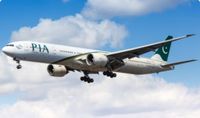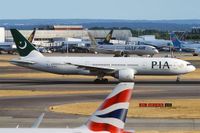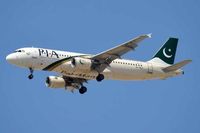KARACHI– A crucial meeting of the UK Air Safety Committee took place on March 20, 2025, to review the prolonged ban on Pakistani Airlines, particularly focusing on Pakistan International Airlines (PIA). This ban has been in place since July 2020, following serious revelations regarding fraudulent pilot licenses. Key officials in the Pakistani aviation sector are expressing optimism ahead of this decision, believing it could lead to lifted restrictions crucial for the national carrier's return to international skies.
The origins of this ban can be traced back to 2020, during the administration of the Pakistan Tehreek-e-Insaf party, when Ghulam Sarwar Khan, the then aviation minister, disclosed shocking information about pilots flying with fake licenses. This announcement echoed particularly loudly in the wake of the tragic crash of a PIA Airbus A320 in Karachi that resulted in nearly 100 fatalities. Such catastrophic events sparked immediate action from UK and European aviation authorities, resulting in all Pakistani carriers being barred from their airspace. Notably, this ban has had a devastating impact on PIA’s revenue, costing the airline approximately Rs40 billion, or about $144 million, annually.
In the midst of the challenges, there have been recent silver linings for Pakistani aviation. In January 2025, PIA successfully resumed its first direct flight from Islamabad (ISB) to Paris (CDG), marking a significant milestone in signaling its willingness to return to international aviation standards. Abdullah Hafeez Khan, a spokesperson for PIA, indicated that once the airline receives clearance from the UK’s Department for Transport, priority flights will likely include London Heathrow (LHR), Manchester (MAN), and Birmingham (BHX).
The UK-Pakistan air travel corridor is particularly crucial, considering it’s a vital link for approximately 1.2 million British Pakistanis, one of the UK's largest diaspora communities. Demand for direct flights remains high, as this route serves not only families and relatives but also business travellers and tourists alike. Prior to the 2020 ban, PIA and others operated multiple weekly flights connecting major cities like London, Manchester, Birmingham, Islamabad, Lahore, and Karachi.
Passengers have faced hardships as a result of the ban, including increased costs and longer travel times due to dependence on connecting flights through Middle Eastern hubs such as Dubai and Doha. These disruptions have not only inconvenienced travellers but have also presented Gulf carriers with advantages at the expense of Pakistani airlines.
Looking forward, if the ban is lifted, experts anticipate rapid restoration of direct services, which could potentially reignite economic opportunities both in Pakistan and the UK. Officials believe improved connectivity could bolster tourism, particularly in Pakistan's northern regions, which are gaining recognition as beautiful travel destinations.
Moreover, the restoration of direct flights would enhance trade relations between the countries, allowing faster air cargo options that could be pivotal as both nations seek to expand their commercial partnerships in the post-Brexit landscape.
As crucial members of the aviation safety assessment convene, spirits remain high among Pakistani airlines that have been implementing necessary reforms aimed at increasing safety and regulatory compliance. PIA has undergone rigorous audits by global aviation bodies, working towards meeting the expectations set by both Pakistani and international authorities.
However, the ultimate decision will hinge on the UK Air Safety Committee’s evaluation of whether Pakistani aviation authorities have made sufficient progress to ensure the safety and security of air travel into the UK. A favorable outcome could breathe life back into PIA operations within UK airspace and significantly impact both the aviation industry and broader economies of both nations.
In a world gradually emerging from the impacts of the COVID-19 pandemic, the restoration of air services could be a significant driver of growth between Pakistan and the UK. As travel restrictions ease and economic activities begin to revitalize, this was recognized as an opportune moment for stronger collaborations.
The March 20 meeting of the UK Air Safety Committee thus represents a critical juncture in the story of UK-Pakistan aviation relations. An optimistic view arises amid the shadows of past woes, collectively fostering hopes for renewed cultural, economic, and familial exchanges that can only be realized by trustworthy air connectivity.
As the air safety committee toils through its deliberations, stakeholders pray for progress that could reshape the aviation landscape of Pakistan, bringing an influx of flights back to the skies while propelling a new era of development in partnerships between the UK and Pakistan.



